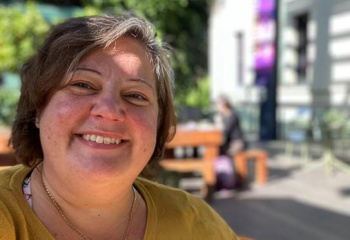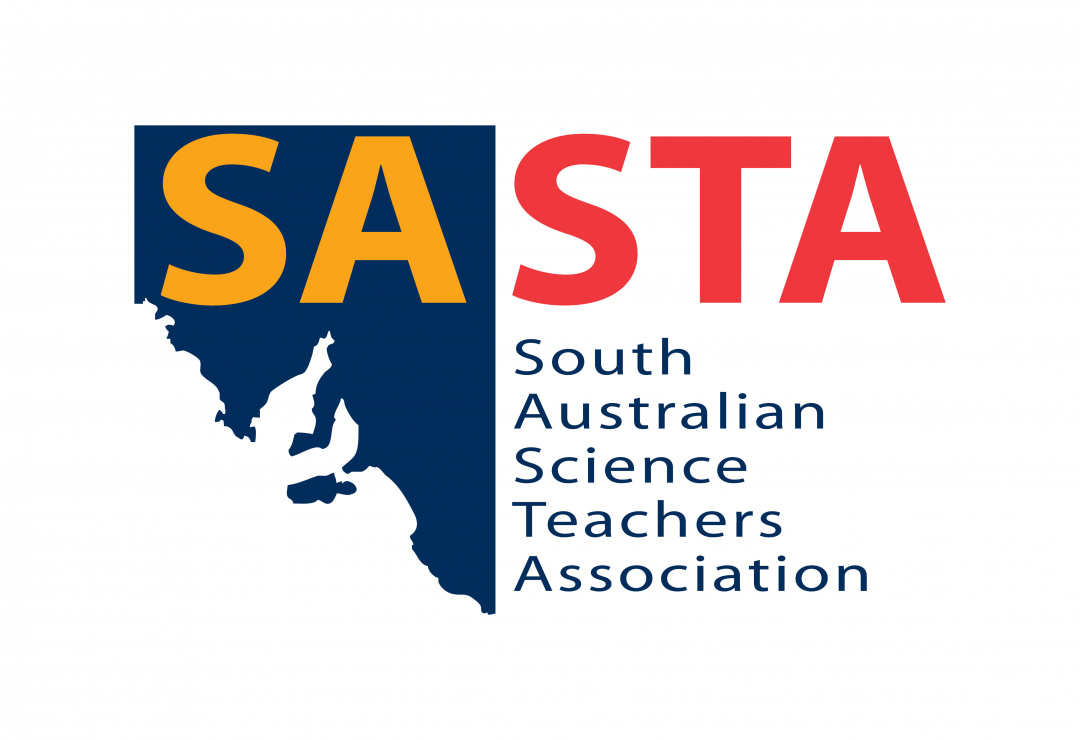Posted by SASTA
on 22/07/2024

We're sharing some of the achievements and journeys of our science educators. Read on to find out more, including their favourite science fact!
Stefania Pulford, Thebarton Senior College
What inspired you to become a science teacher?
My love of learning, helping others and physical science is what inspired me to become a science teacher. I remember having an epiphany when I was in third year university studying geology and geophysics, when I was helping some of my peers identify specific mineral features under petrographic microscopes, that maybe I was focusing on the wrong career path. I realised that while I absolutely love geology and the idea of uniformitarianism (using understanding of recognisable features today to explain formation of features in the past), that what I really enjoyed doing was helping others see how amazing these concepts are. From that point on, I decided I was going to complete a graduate diploma in teaching after I finished my initial degree, and I really have not looked back.
Helping students appreciate their observations and apply understanding from these observations to make meaning in other circumstances still makes me incredibly happy.
Can you tell us about one of your proudest accomplishments or a new program/idea you’re running with your students?
Over the last 3 years, I have been working on improving engagement for neurodiverse learners.
Approximately 20% of the population are neurodiverse. This can affect engagement in a range of ways for individuals but in particular, engagement and understanding of tasks can be really difficult. I have been researching different ways individuals can process information and refining how I provide instruction and scaffolding to make it much more accessible for a broader range of students. This means that I have been using visual techniques to enhance understanding of sequencing and visual processing, and been providing much more flexibility in how students can present their understanding at a Stage 2 level (specifically in Physics). So far, I have been seeing mixed results; it definitely depends on the student’s specific needs, the task itself and other distracting circumstances that I have little influence over. Despite this, I have found that the fact that I am willing to model an environment where I am happy to trial and adapt, has created a learning space where students are much more willing to try and give it a go. It has also created much stronger student-teacher relationships, where students are much more comfortable attending and interacting in the first place.
Another area of research and professional development I have been focusing on that is intrinsically linked to better engaging a broad range of learners is the connections individuals have with others and their ability to bounce back in the face of challenge (resilience). I have been participating in active learning to develop activities in the classroom that encourage a shared responsibility in the learning that happens and helps foster social interactions that can connect learners to each other. This has involved multiple iterations of how to engage my students in learner created knowledge and shared content generation where I have also tried to encourage and facilitate conversations between learners, so that they can share and respond to their own feedback. So far, this has shown some really amazing results, especially in creating learning environments where students help each other solve problems and participate in classroom discussions really organically.
The third area that I have focused on to develop strategies to support neurodiverse learners is around generating student questions, especially in the design practical (Senior Science course requirement). I am currently experimenting with providing visual prompts (and physical apparatus) to generate student curiosity and questioning when trying to generate design and deconstruction prompts. I have only just started this particular journey and look forward to sharing my observations in a future STEM Conference.
I really love researching and implementing new practice ideas. What I love about teaching most is the opportunity it provides for me to learn. Learning how other people learn is absolutely fascinating and getting to experiment with different models, allows me to foster my own curiosity, modelling exactly what I want my students to do.
What advice would you give fellow science teachers?
I think that it is really important for all of us to network with other teachers. I have been attending and presenting at conferences for over 10 years and it is something that I will continue to do for my entire career. The best way to find new ways to do something and to problem solve is to ask other people what they do and engage in discussions that promote further curiosity. I am constantly getting inspiration from my peers and through the process of speaking to others about what I am trialling, it helps build and reshape my own understanding of how learning works. My students have benefited from this immensely but so has my own professional practice.
Tell us your favourite science fact
Electrons (and quantum entities) can behave differently when being observed (as either a particle or a wave), depending on the experimental circumstances and how they are detected (wave-particle duality).
Vera Dunaiski, Westminster School
What inspired you to become a science teacher?
Teaching is actually my third career. The inspiration to transfer to a career in teaching came from supervising postgraduate students whilst working as a post-doctoral research fellow. I valued being a part of the development of the students’ learning and sharing their passion. I also loved the research aspect of my work but struggled with the lack of time I had available for my family, so I made the decision to focus on teaching, quit my job and went back to University to get my teaching qualifications.
Can you tell us about one of your proudest accomplishments or a new program/idea you’re running with your students?
First and foremost, I am so proud of the accomplishments of my students, especially the Stage 2 Chemists, that have achieved more than they thought they could. Especially those that faced considerably adversity. I think building students’ confidence in their own abilities is partly responsible for this.
The part of my job that I am most proud of is related to the aspect of the work I enjoy most. Creating assessment tasks. I love developing new ideas for undertaking investigations that allow for student agency and critical thinking. I strive to never run the same investigation twice so am regularly working on new ideas.
What advice would you give fellow science teachers?
Be a part of a network of colleagues. Everyone has something that they are good at and as a group, work with your strengths.
Keep the passion for Science alive and take it into the classroom.
Tell us your favourite science fact
Bananas are radioactive.
 Lisa Cibich, Saint Ignatius' College
Lisa Cibich, Saint Ignatius' College
What inspired you to become a science teacher?
I have always loved Science as a child, I loved dinosaurs and marine life and was fascinated by chemical reactions. I enjoyed applying science to fix things and to build things and whilst at University I could not just apply myself to one aspect of science and therefore teaching seemed the best option for me to be able to share my passion each day with young people inspiring them to take on Science.
Can you tell us about one of your proudest accomplishments or a new program/idea you’re running with your students?
I have had the privilege of introducing Stage 1 and 2 Nutrition at my previous school and now at my new school working collaboratively with like-minded staff to bring science in a new field to students.
What advice would you give fellow science teachers?
Keep finding the relevance for students, have students determine why they are learning, provide opportunities for students to become confident in science literacy and numeracy to become critical thinkers.
Tell us your favourite science fact
My favourite is telling students that their egg before fertilisation was actually carried inside their maternal grandmother whilst pregnant with their mum! Therefore they were also in part carried by their grandmother.
 James Snudden, Harvest Christian College
James Snudden, Harvest Christian College
What inspired you to become a science teacher?
I have always loved science, which led to me completing a Bachelor of Science after Year 12. Near the end of this degree I became a Christian and went on to complete an Advanced Diploma in Christian Ministry. With a passion for both science and Christian ministry I was inspired to pursue the idea of working as a science teacher in Christian schools. My first teaching practicum confirmed that being a science teacher in a Christian school would provide me with many opportunities to make a meaningful difference in the lives of the young people entrusted to my care.
Can you tell us about one of your proudest accomplishments or a new program/idea you’re running with your students?
For the last couple of years, thanks to government grants, I have been able to run 'STEM Enrichment Tours' in which we take a small group of students who are pursuing or considering a STEM pathway on an interstate trip, all expenses paid. We go for about a week and travel to a broad range of world-class STEM sites where our students get to hear from STEM professionals, see them in action, and hear about the cutting-edge research or work that they are doing. These bespoke experiences showcase the best of what it can mean to have a career in a STEM field and many participating students find inspiration during these tours.
What advice would you give fellow science teachers?
Relationships are everything: with your colleagues, your line manager, your lab technician, your contacts in industry and at the universities but especially with your students. Find out what their STEM interests are and incorporate opportunities for them to pursue their specific areas of interest within the class and excursion experiences you organise. If a few students like astronomy, take them to the planetarium. If a couple are thinking about becoming veterinarians, take them to an open day at Roseworthy. Everybody will win - you, your students, their families, your school!
Tell us your favourite science fact
That many biological processes are carried out by crazy complex molecular machines!
In this Section
Archive
- February 2026
- January 2026
- December 2025
- November 2025
- October 2025
- September 2025
- August 2025
- July 2025
- June 2025
- May 2025
- April 2025
- March 2025
- February 2025
- January 2025
- December 2024
- November 2024
- October 2024
- September 2024
- August 2024
- July 2024
- June 2024
- May 2024
- April 2024
- March 2024
- February 2024
- December 2023
- November 2023
- October 2023
- September 2023
- July 2023
- June 2023
- May 2023
- April 2023
- March 2023
- February 2023
- January 2023
- December 2022
- November 2022
- October 2022
- August 2022
- July 2022
- June 2022
- May 2022
- April 2022
- March 2022
- February 2022
- January 2022
- December 2021
- November 2021
- October 2021
- September 2021
- August 2021
- July 2021
- June 2021
- May 2021
- April 2021
- March 2021
- February 2021
- January 2021
- December 2020
- November 2020
- October 2020
- September 2020
- August 2020
- July 2020
- June 2020
- May 2020
- April 2020
- October 2018
- September 2018
- August 2018
- July 2018

